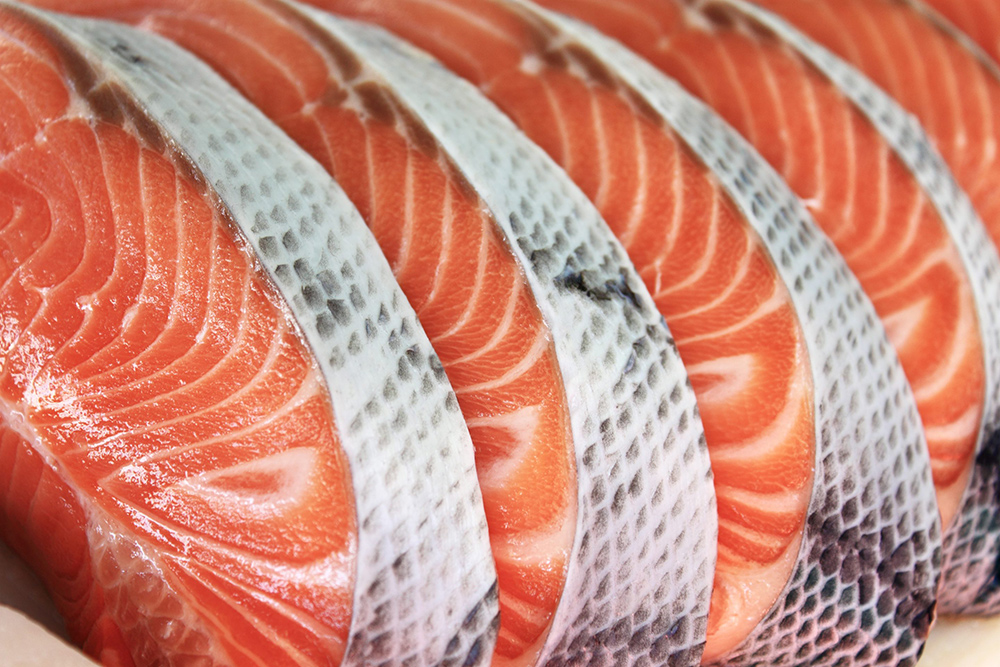这三种食物有助于改善情绪

从生物化学方面解释饮食对大脑健康的影响,可以归结于肠道。
内科医生、Big Bold Health的科学与临床创新高级总监奥斯汀·珀尔马特说:“我们越来越多地了解到,肠道包括肠道菌群的健康,与大脑健康密切相关。”肠道菌群由在人体胃肠道中生存的数以万亿计的微生物组成,它们会与我们消化的营养物质发生反应。
专家指出,肠道以免疫信号的形式发出的信息,能够通过迷走神经发送给大脑。珀尔马特表示,饮食会影响这些免疫信号,而我们的肠道和摄入的食物可以对这些信号进行“训练”或“编程”。
饮食可能导致肠道菌群失衡,进而引发炎症。研究发现,炎症会对情绪产生负面影响,引发与焦虑相关的心理健康问题。对动物开展的其他初步研究显示,肠道变化会影响大脑健康,包括增加患阿尔茨海默症和抑郁症的风险。
珀尔马特称:“如果你知道肠道内有数以万亿计的细菌,你正在摄入各种不同的食物分子,它们会影响你的免疫系统,你就会意识到,你每天在肠道中摄入的食物正在塑造你的身体。你会开始明白,你吃的食物,也就是你向肠道发送的信息,会直接影响大脑功能。”
虽然没有一种通用的饮食能够改善精神健康,但有些建议可以帮助你通过肠道摄入的食物,优先考虑大脑健康,这些建议包括你能够摄入哪些食物。
食物多样化
食品加工公司ADM的医学事务与临床开发副总裁理查德·戴博士表示,虽然还需要开展更多研究才可以确定“健康菌群”的意义,但“多样化菌群”似乎最接近于健康菌群。
戴指出:“大量摄入不同植物纤维,为多样化菌群的诞生奠定了基础。”
在《美国临床营养学杂志》(American Journal of Clinical Nutrition)上发表的一篇研究论文认为,摄入包含八种主要食物种类的饮食,包括蔬菜、水果、海鲜和坚果等,有益于体内菌群和肠道的总体健康。
鱼类
《情感障碍杂志》(Journal of Affective Disorders)于2016年发表的一篇论文称,摄入富含鱼类和欧米伽-3脂肪酸的饮食,能够降低抑郁风险。
珀尔马特建议食用小型冷水鱼类,例如三文鱼、鲭鱼、鳀鱼、沙丁鱼、鲱鱼(合称为“SMASH”)等。
鱼类是地中海饮食的主要组成部分之一,对精神健康具有积极影响。地中海饮食以植物类天然食品、鱼类、蔬菜和健康脂肪为主。
富含多酚的食物
多酚是一种微量元素,常见于绿叶蔬菜和接骨木梅、蓝莓等五颜六色的水果当中,可能有益于大脑健康。
珀尔马特说:“多酚的效果之一是作为益生菌,可以对菌群产生积极影响。当我们摄入多酚时,它们能够在一定程度上抑制不健康细菌的生长。”
富含纤维的食物
事实证明,富含纤维的食物也有益于肠道菌群,可以影响免疫系统。摄入纤维能够产生短链脂肪酸,对人体有许多益处。
珀尔马特表示:“短链脂肪酸可以影响人体免疫系统,但有人认为它们可能进入大脑,进而影响大脑功能。它们可能还有消炎效果。”
饮食中可以包括全谷物、豆类、坚果、洋姜、蒲公英叶、大蒜和洋葱等食物。
珀尔马特说:“我们依旧需要进行更多研究,了解哪些类型的菌群干预对人体是有益的。但如今有数以千万计的人患有临床忧郁症,有更多人正在努力改善情绪,因此人们迫切需要针对情绪问题找到新的解决方案,而肠道可能就是解决方案之一。”(财富中文网)
译者:刘进龙
审校:汪皓
从生物化学方面解释饮食对大脑健康的影响,可以归结于肠道。
内科医生、Big Bold Health的科学与临床创新高级总监奥斯汀·珀尔马特说:“我们越来越多地了解到,肠道包括肠道菌群的健康,与大脑健康密切相关。”肠道菌群由在人体胃肠道中生存的数以万亿计的微生物组成,它们会与我们消化的营养物质发生反应。
专家指出,肠道以免疫信号的形式发出的信息,能够通过迷走神经发送给大脑。珀尔马特表示,饮食会影响这些免疫信号,而我们的肠道和摄入的食物可以对这些信号进行“训练”或“编程”。
饮食可能导致肠道菌群失衡,进而引发炎症。研究发现,炎症会对情绪产生负面影响,引发与焦虑相关的心理健康问题。对动物开展的其他初步研究显示,肠道变化会影响大脑健康,包括增加患阿尔茨海默症和抑郁症的风险。
珀尔马特称:“如果你知道肠道内有数以万亿计的细菌,你正在摄入各种不同的食物分子,它们会影响你的免疫系统,你就会意识到,你每天在肠道中摄入的食物正在塑造你的身体。你会开始明白,你吃的食物,也就是你向肠道发送的信息,会直接影响大脑功能。”
虽然没有一种通用的饮食能够改善精神健康,但有些建议可以帮助你通过肠道摄入的食物,优先考虑大脑健康,这些建议包括你能够摄入哪些食物。
食物多样化
食品加工公司ADM的医学事务与临床开发副总裁理查德·戴博士表示,虽然还需要开展更多研究才可以确定“健康菌群”的意义,但“多样化菌群”似乎最接近于健康菌群。
戴指出:“大量摄入不同植物纤维,为多样化菌群的诞生奠定了基础。”
在《美国临床营养学杂志》(American Journal of Clinical Nutrition)上发表的一篇研究论文认为,摄入包含八种主要食物种类的饮食,包括蔬菜、水果、海鲜和坚果等,有益于体内菌群和肠道的总体健康。
鱼类
《情感障碍杂志》(Journal of Affective Disorders)于2016年发表的一篇论文称,摄入富含鱼类和欧米伽-3脂肪酸的饮食,能够降低抑郁风险。
珀尔马特建议食用小型冷水鱼类,例如三文鱼、鲭鱼、鳀鱼、沙丁鱼、鲱鱼(合称为“SMASH”)等。
鱼类是地中海饮食的主要组成部分之一,对精神健康具有积极影响。地中海饮食以植物类天然食品、鱼类、蔬菜和健康脂肪为主。
富含多酚的食物
多酚是一种微量元素,常见于绿叶蔬菜和接骨木梅、蓝莓等五颜六色的水果当中,可能有益于大脑健康。
珀尔马特说:“多酚的效果之一是作为益生菌,可以对菌群产生积极影响。当我们摄入多酚时,它们能够在一定程度上抑制不健康细菌的生长。”
富含纤维的食物
事实证明,富含纤维的食物也有益于肠道菌群,可以影响免疫系统。摄入纤维能够产生短链脂肪酸,对人体有许多益处。
珀尔马特表示:“短链脂肪酸可以影响人体免疫系统,但有人认为它们可能进入大脑,进而影响大脑功能。它们可能还有消炎效果。”
饮食中可以包括全谷物、豆类、坚果、洋姜、蒲公英叶、大蒜和洋葱等食物。
珀尔马特说:“我们依旧需要进行更多研究,了解哪些类型的菌群干预对人体是有益的。但如今有数以千万计的人患有临床忧郁症,有更多人正在努力改善情绪,因此人们迫切需要针对情绪问题找到新的解决方案,而肠道可能就是解决方案之一。”(财富中文网)
译者:刘进龙
审校:汪皓
There’s a biochemical explanation for why diet may affect brain health, and it comes back to the gut.
“We’re increasingly learning that the health of the gut—so that includes the gut microbiome—is closely linked to the health of our brains,” says Austin Perlmutter, a doctor of internal medicine and senior director of science and clinical innovation at Big Bold Health. The gut microbiome is made up of trillions of microorganisms living in our gastrointestinal tract that interact with the nutrients we digest.
Experts note that messages from the gut, in the form of immune signals, can be sent to the brain through the vagus nerve. Diet can affect those signals, which can be “trained” or “programmed” by our gut and, therefore, what we eat, Perlmutter says.
Diet can cause an imbalance of bacteria in the gut, which is associated with inflammation. Studies show that inflammation can negatively affect mood and lead to anxiety-related mental health problems. Other preliminary studies in animals show that changes in the gut affect brain health, including increasing the risk of Alzheimer’s disease and depression.
“If you think about the fact that you have trillions of bacteria in your gut, that you’re taking in all of these different food molecules, and that your immune system is there, you realize that every day all of the input that goes into your gut is shaping your body,” Perlmutter says. “You can start to appreciate that the foods that you eat, the information coming into your gut, has a direct effect on your brain function.”
While there is no one-size-fits-all diet that can improve mental health, there are some tips you can follow—including which food groups to eat—in order to prioritize your brain health through what you feed your gut.
Overall food diversity
While more research is needed to define what it means to have a “healthy microbiome,” a “diverse microbiome” seems to be the closest fit, says Dr. Richard Day, vice president of medical affairs and clinical development at ADM, a food processing company.
“By consuming a large number of different plant fibers, that gives the building blocks for the emergence of diverse bacterial populations,” Day says.
In a study published in the American Journal of Clinical Nutrition, maintaining a diet in eight main food groups, including vegetables, fruits, seafood, and nuts among others, benefited a person’s overall microbiome and gut health.
Fish
Consuming a diet rich in fish and omega-3 fatty acids was associated with a lower risk for depression, according to a 2016 study published in the Journal of Affective Disorders.
Perlmutter recommends eating small, cold-water fish like salmon, mackerel, anchovies, sardines, and herring (also known as SMASH).
Fish are a big part of the Mediterranean diet, which has been linked to positive mental health outcomes. The diet is a way of eating that focuses on plant-based whole foods, fish, vegetables, and healthy fats.
Foods rich in polyphenols
Polyphenols are micronutrients most commonly found in plants, including leafy greens and colorful fruits, like elderberries and blueberries, and can be a positive for brain health.
“One of the things they do is they act as probiotics, so they can positively influence the microbiome,” Perlmutter says. “When we consume polyphenols, they can kind of suppress the growth of unhealthy bugs.”
Foods rich in fiber
High-fiber foods are also shown to have positive effects on the gut microbiome, which affects the immune system. Consuming fiber produces short-chain fatty acids, which benefit the body in a myriad of ways.
“These short-chain fatty acids can influence our immune system, but it’s also thought that they can get into our brains and influence our brain function,” Perlmutter says. “They may have an anti-inflammatory effect.”
Consider incorporating whole grains, beans, nuts, Jerusalem artichokes, dandelion greens, garlic, and onions into your diet.
“We still need to know a lot more about what types of microbiome interventions may make sense for individuals,” Perlmutter says. “But in an age where hundreds of millions of people have clinical depression, and many more are struggling to improve mood, there is absolutely a pressing need to find new solutions for mood issues, and the gut may offer that.”













